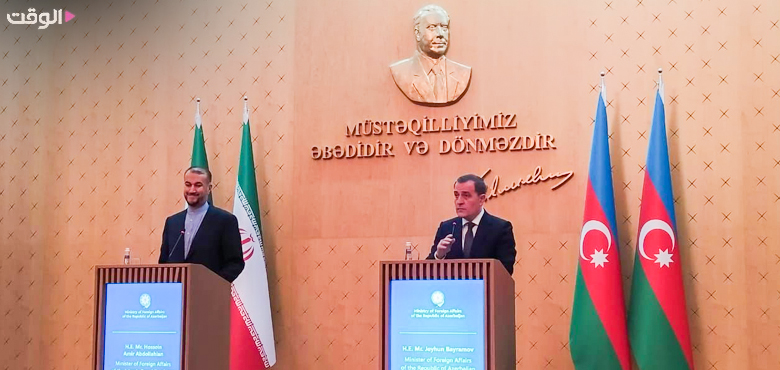Alwaght- Iran's Foreign Minister Hussein Amir-Abdollahian visited Azerbaijan as part of an important regional tour, discussing with Azerbaijani officials boost of bilateral ties and the common issues.
Although this is his first visit to Baku since he assumed the post in August, over the past few months he had meetings with his Azerbaijani counterpart on the sidelines of Economic Cooperation Organization (ECO) and the Organization of Islamic Cooperation (OIC) summits and so the Wednesday visit is meant to settle the differences and prepare the foundation for better neighborly relations and cooperation in various areas.
Karabakh case and significance of regional stability
The last year Karabakh war and recent clashes between the Azerbaijan and Armenia, as the main parties to the conflict, which was accompanied by the role of other regional actors such as Turkey and the Israeli regime in fueling the crisis, led to significant geopolitical changes in the region. Accordingly, the escalation of the conflict on the first anniversary of the peace agreement once again proved the teetering stability in the sensitive region of Caucasus and the need for regional efforts to prevent a resurgence of the crisis. This led to efforts to establish mechanisms for advancing peace and resolving disputes based on diplomacy and the common good, and for example the 3 + 3 mechanism, including Azerbaijan, Armenia, and Georgia as regional states and Russia, Iran, and Turkey as powerful players with interests in the region, was born out of the need for Iran to be a key member of this regional initiatives.
On the other hand, the Islamic Republic, having economic, security and geopolitical interests in the Karabakh region, has always warned of the divisive, destabilizing, and negative interference of foreign actors such as the Israeli regime in its neighborly relations with Azerbaijan.
Part of Amir-Abdullahian's talks with Baku officials was on the important issue of the need to maintain stability in the Karabakh region and implement the peace deal within the framework of the agreements reached. He also reiterated Tehran's support for Azerbaijan retaking of its occupied territories.
Amir-Abdollahian's economic diplomacy
With the assumption of power by Sayyed Ibrahim Raisi, the new Iranian president announced as top foreign policy agenda bolstering ties with neighbors.
The relations between Iran and Central Asia have a long history and in every corner of the geography of this region, traces of such relations can be seen in the common culture of the peoples and nations of Central Asia with the Iranian civilization.
The existence of cultural bands can be an important driver in bringing political relations closer, and the closeness of political relations can also lead to the strengthening of economic cooperation and, as a result, the expansion of prosperity and the development of regional countries.
But one of the most important issues having to do with advancing the economic cooperation between Iran and Azerbaijan, which was among the goals of Amir Abdullahian's visit to Baku, is the activation of transit corridors and trade between the two countries.
In related comments, the Iranian foreign policy chief before flying to Baku said: "I carry various ideas to further develop the cooperation and I'll raise them with the Azerbaijani president."
Sayed Abbas Mousavi, the Iranian ambassador to Baku, before Amir-Abdollahian's trip in a Twitter post said: "After reviving the ECO corridor (Pakistan, Iran, and Turkey) and test-starting the North-South global corridor (Finland, Russia, Azerbaijan, Iran, Persian Gulf, and India), this week will witness activation of a new corridor (Iran, Azerbaijan, Georgia, Red Sea, and Europe.)"
North-South corridor, important part of which passing Iranian soil, reaches Indian Ocean, Persian Gulf, and South East Asia countries by crossing north Scandinavian countries, Russia, and Iran. The corridor makes various crossroads with Central Asia, Europe, and Transport Corridor Europe-Caucasus-Asia (TRACECA) and is the shortest, cheapest, and most suitable transit route between Asia and Europe.
Cooperation in energy, technology, and engineering sectors, including construction of dams and hydropower plants, is another major area of economic cooperation and mutual interest.
Meanwhile, Iran's share of Azerbaijan market is not very significant and according to the economic statistics of the Iranian Customs Organization in 2020, Iran's exports to Azerbaijan were only worth $510 million.
Under these circumstances, pursuit of economic diplomacy as a top agenda in the foreign ministry will make Amir-Abdullahian's visit to Baku a step towards strengthening economic cooperation between the two neighbors.



























